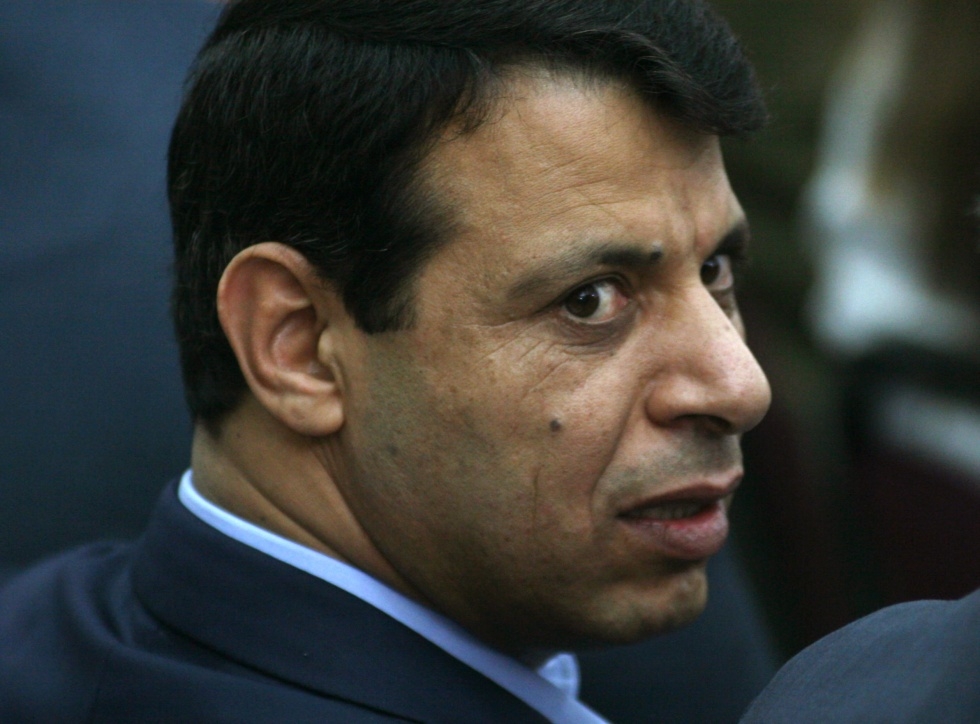Profile: Mohammed Dahlan, Gaza's comeback kid

Over the course of his long and turbulent political career, Mohammed Dahlan has been called many different things: a Palestinian freedom fighter, a murderer, a future leader of Fatah - even a Central Intelligence Agency (CIA) operative and an Israeli spy.
Although a onetime protégé of Yasser Arafat, Dahlan has also been accused of poisoning and killing his former mentor. He has likewise swung from being a strong ally of Palestinian President Mahmoud Abbas to one of his most hated enemies. In March, Abbas dredged up accusations linking Dahlan to Arafat's death in 2004 ‑ remarks that will likely send reverberations through the Palestinian political scene for years to come.
Dahlan: the early years
Dahlan was born in Gaza’s Khan Yunis Camp in 1961, when the Strip was still under Egyptian control. He became politically active early, helping to found Gaza’s wing of the Fatah youth movement, Shabiba, at age 20. The association landed him in an Israeli jail for much of the early 1980s – time which Dahlan used to learn fluent Hebrew.
When the First Intifada broke out in 1987, Dahlan briefly established himself as the uprising's youth leader in Gaza. After he was arrested and deported to Jordan in 1988, he made his way to Tunis to rendezvous with the exiled PLO leadership where he met Arafat for the first time and truly began rising through the political ranks.
While Dahlan played a minor role in the Oslo Peace Process, following the PLO leadership’s return from exile in 1994, he was handed control of Gaza’s newly created Preventive Security Service (PSS). The force was American funded and numbered some 20,000 men, making it one of the most powerful Palestinian security branches in existence.
Dahlan, America, and his Israel connection
This power, however, came at a price. Dahlan quickly came embroiled in allegations of widespread corruption and heavy-handedness. Gaza was nicknamed “Dahlanistan” during his rule. As part of his PSS appointment, Dahlan received CIA military training and worked closely with Israeli’s security services on imprisoning scores of Palestinians, mainly Hamas supporters. In 2002, according to Abbas’ most recent accusations, Dahlan helped coordinate an Israeli airstrike that killed prominent Hamas figure Salah Shahadeh along with his wife, daughter and 12 other civilians.
Dahlan’s reputation won him enemies at home but strengthened his standing abroad. The Americans and the Israelis are said to have regarded him as a pragmatist who could get things done. This helped Dahlan play a relatively prominent role in the 2000 Camp David Summit and allowed him to ally with the West once these talks collapsed and the Second Intifada ignited.
Arafat's and Dahlan's relationship had been deteriorating for some time, but it disintegrated in 2002 when Dahlan resigned from the PSS, allegedly to challenge Arafat for the leadership. At the last minute Dahlan backed out, but as the Intifada intensified and Israeli troops moved in to besiege Arafat’s Ramallah compound, he seized the opportunity to establish himself as one of a so-called “Gang of Five” who in effect governed in Arafat’s place.
Following Arafat’s resignation as president in March 2003, Abbas took the post and subsequently named Dahlan the Palestinian minister of state for security. The handover of power allowed peace talks to resume - with Dahlan allegedly catching the attention of US President George W Bush - but divisions with Arafat soon unravelled, forcing Abbas to resign that October.
Dahlan’s post-Arafat and anti-Abbas dalliances
Arafat’s suspicious death in 2004 set the stage for Israeli’s withdrawal from Gaza in 2005 and for Palestinian National Council elections in 2006. These elections, however, brought Hamas to power in the Strip and widespread clashes followed between Hamas and Fatah supporters. These intensified in December after a failed assassination attempt on Hamas' prime minister Ismail Haniyeh. After the affair, Dahlan was forced into exile again, with an explosive 2008 Vanity Fair article subsequently linking him and the CIA to the botched putsch.
After fleeing to the West Bank, Dahlan soon turned on his Fatah allies, accusing Abbas of allowing his sons to profit from government contracts. The rift grew so wide that in January 2010, Dahlan was linked to a plot to overthrow Abbas. A year later, Fatah revoked his membership and Dahlan was forced into exile once again.
Dahlan spent this latest banishment between Egypt and the UAE, where he has built ties with Gulf donors and Egyptian security personnel. The latest rumblings now suggest Dahlan is gearing up to use these connections to regain a foothold in Gaza and possibly seek the Palestinian presidency.
New MEE newsletter: Jerusalem Dispatch
Sign up to get the latest insights and analysis on Israel-Palestine, alongside Turkey Unpacked and other MEE newsletters
Middle East Eye delivers independent and unrivalled coverage and analysis of the Middle East, North Africa and beyond. To learn more about republishing this content and the associated fees, please fill out this form. More about MEE can be found here.

